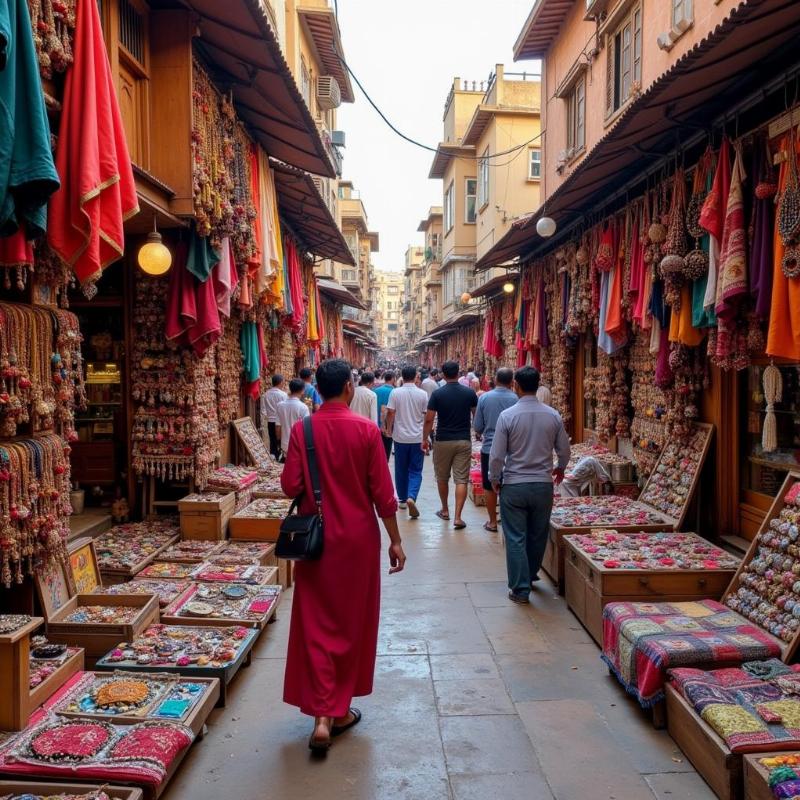Geography plays a crucial role in shaping the tourism industry. From influencing the choice of destinations to determining the types of activities available, geographical factors are at the heart of every travel experience. Understanding the importance of geography in tourism helps us appreciate the diversity of our planet and the unique experiences each destination offers. It also allows us to plan more sustainable and responsible travel itineraries.
How Geography Shapes Tourist Destinations
The physical geography of a location, including its climate, landforms, and natural resources, heavily influences its appeal as a tourist destination. Think about it: would tropical beaches be as attractive without sunshine and warm waters? Would mountain ranges draw hikers and climbers if they weren’t majestic and challenging? The natural environment provides the foundation upon which tourism activities are built.
For example, the Himalayas, with their towering peaks and stunning valleys, attract adventurers from all over the world. Their unique geographical features create opportunities for trekking, mountaineering, and simply enjoying the breathtaking scenery. Similarly, the coastal regions of India, blessed with diverse beaches and marine life, offer a different set of attractions, from sunbathing and watersports to exploring vibrant coral reefs.
The Influence of Climate on Tourism
Climate plays a significant role in determining the peak season for different destinations. Destinations with pleasant weather year-round, like Goa, enjoy a steady flow of tourists. On the other hand, places with extreme temperatures or distinct wet and dry seasons experience fluctuations in visitor numbers. Understanding these patterns is essential for planning your trip and finding the best deals.
Cultural Geography and Tourism
Geography doesn’t just refer to physical landscapes; it also encompasses cultural landscapes. The human imprint on a place, its history, traditions, architecture, and cuisine, adds another layer to the tourist experience. Exploring local markets, visiting ancient temples, and interacting with communities allows travellers to delve deeper into a destination’s cultural richness.
 Local Market in Rajasthan Showcasing Cultural Products
Local Market in Rajasthan Showcasing Cultural Products
For example, a visit to Rajasthan might involve exploring magnificent forts and palaces, witnessing traditional dance performances, and savouring the unique flavours of Rajasthani cuisine. These cultural experiences are deeply intertwined with the region’s geography and history.
The Importance of Accessibility
Accessibility is another key geographical factor that influences tourism. How easy is it to reach a destination? Are there good transport links? The availability of flights, trains, roads, and other infrastructure greatly impacts the number of tourists a place can attract. Remote and less accessible areas often offer unique experiences but may attract fewer visitors due to logistical challenges.
important of geography in tourism
Sustainable Tourism and Geography
Understanding the relationship between geography and tourism is crucial for developing sustainable tourism practices. Identifying environmentally sensitive areas, managing resources responsibly, and minimizing the negative impact of tourism on local communities are all geographical considerations.
importance of tourism geography
How does geography influence tourism development?
Geography plays a fundamental role in tourism development, dictating where attractions are located, shaping the type of activities offered, and influencing accessibility.
Why is understanding cultural geography important for tourists?
Understanding cultural geography enriches the travel experience by providing insights into a destination’s history, traditions, and way of life. It allows travellers to connect with the local culture on a deeper level.
Conclusion
The importance of geography in tourism cannot be overstated. It shapes the very essence of the travel experience, from the landscapes we admire to the cultures we encounter. By understanding the geographical factors at play, we can not only appreciate the diversity of our planet but also contribute to a more sustainable and responsible tourism industry.
FAQ
-
How does geography affect tourism planning? Understanding geographical factors, such as climate and accessibility, is essential for choosing the right time to visit a destination and planning logistics effectively.
-
What is the role of geography in ecotourism? Ecotourism relies heavily on understanding the geographical characteristics of an area to minimize the environmental impact of tourism and promote conservation.
-
How can I learn more about the geography of a place before I travel? Numerous resources, including guidebooks, websites, and documentaries, offer valuable insights into the geography and culture of different destinations.
-
Why is geographical knowledge important for tour operators? Tour operators need to understand geographical factors to design itineraries that are both appealing and logistically feasible.
-
How does geography influence the cost of travel? Accessibility and remoteness can significantly influence the cost of transportation and accommodation, impacting the overall travel budget.
-
What is the relationship between geography and adventure tourism? Adventure tourism activities, such as trekking and mountaineering, are directly linked to specific geographical features, such as mountains, rivers, and caves.
types of accommodation in tourism industry
About PlaTovi: PlaTovi is your one-stop solution for all your travel needs, offering a wide range of services from customized tour packages and hotel bookings to flight reservations and visa assistance. Whether you’re planning a relaxing beach vacation, an adventurous trek in the Himalayas, or a cultural immersion in Rajasthan, PlaTovi can help you create the perfect travel experience. Contact us today to start planning your next adventure! Email: [email protected], Phone: +91 22-2517-3581.